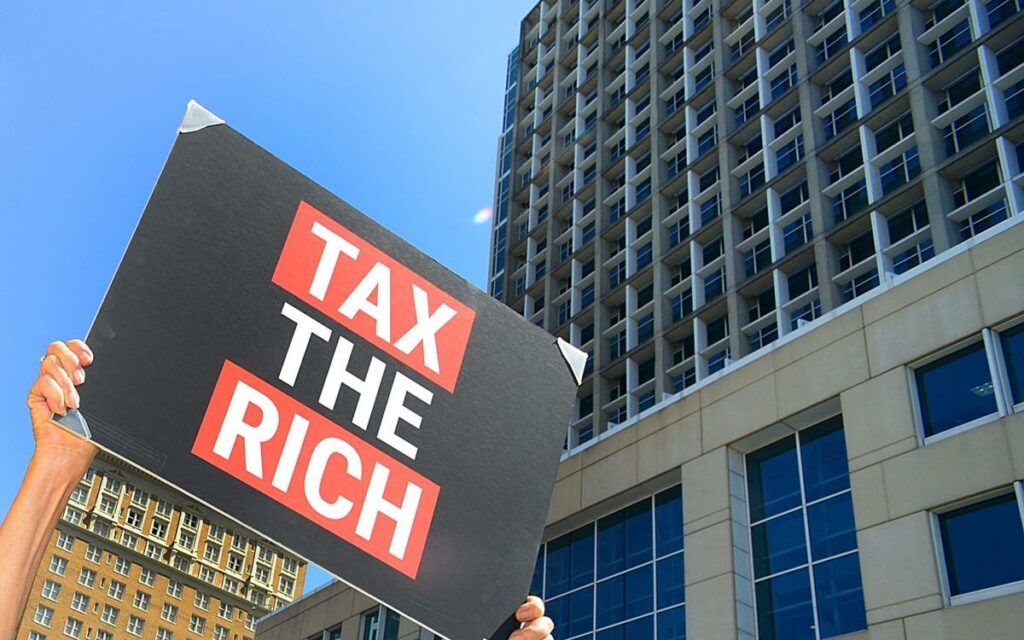
We consistently hear about how the so-called rich don’t pay enough tax. But is that really true in Canada? And in any instance, does punishing the most productive people in a society really help the overall economy? Photo credit: Getty Images/Gerardo Mora
We’ve been hearing a lot about the mythical “fair share” lately, notably from left-leaning politicians, unions and social welfare groups who typically believe that people with above-average incomes and profitable corporations should ante up more of their money to give to others. With the passage of Bill C-18, the Online News Act, the Liberal government has claimed that it is all about having large tech companies like Google, Meta (Facebook) and others pay their “fair share” to Canadian legacy media organizations to include their links to news stories in online posts.
Google and Meta have reacted by completely dropping their former practice of including links to news stories, starting this week. Perversely, this will actually hurt the news outlets that the Trudeau government claims to want to support by limiting the distribution of their content. So far, the Liberals are sticking to their guns with C-18 instead of redesigning this badly flawed legislation, and claiming that the tech giants just need to contribute their “fair share” to legacy media outlets that have been made obsolete by technology.
Another instance of “fair share” discussions happens regularly with our tax system. We consistently hear about how the so-called rich don’t pay enough tax to support all of the costly social programs the Trudeau government continues to pile on to Canadians. A recent Fraser Institute study updated the current status of the tax system, and who pays how much. The full report can be found here.
The main finding of the study was that the top 20 per cent of income-earning families pay about 62 per cent of the country’s total personal income taxes and over half – 53.1 per cent – of total taxes, including sales and excise taxes. The bottom 20 per cent of income-earning families pay less than 1 per cent of all federal and provincial income taxes and 2 per cent of total taxes.
Such a wide variation in tax rates creates all kind of economic distortions that are problematic. Having a significant number of Canadians who effectively pay no taxes at all means they will be supportive of the kind of big government, high tax regimes that ultimately ruin an economy. We need only to look at what happened to Greece in 2009 to see the detrimental effects of high tax rates that punish the productive citizens and businesses yet reward a significant number of people with very early retirements and income supports that effectively reward not working.
Extremely high tax rates on high income earners, although attractive in theory, also lead to professionals, doctors, scientists, engineers and entrepreneurs – the kind of people most economies want to encourage – to leave the high-tax jurisdiction or engage in creative accounting practices to lower their tax load. In Canada, the highest marginal tax rate – over 50 per cent – starts to apply at about $220,000 in annual income. For comparison, the highest US rate of 37 per cent applies at an income level of about $540,000. We Canadians certainly do like to punish the most successful of our citizens.
European countries offer some interesting history for those who promote more “fair share” policies. In 1990, 12 countries in Europe had wealth taxes. Today there are only three. Research into why so many countries dropped their wealth taxes reveals that it was because they were expensive to administer and punished people who had considerable assets but little money – like many property owners in Canada today who are property-rich but cash poor. But the main reason countries got rid of their wealth tax is that it didn’t raise anywhere near the revenue expected. The Trudeau government has found this as well, as their attempts to “soak the rich” haven’t succeeded in raising much money but have distorted the tax system.
Another recent Fraser Institute report here showed that Canadians aren’t as supportive of taxing the rich as much as one might think. In a public opinion poll conducted by Leger Marketing on behalf of the Fraser Institute, half of Canadians surveyed believed that the highest personal income tax rate should be 20 per cent or less. This is a far cry from the highest marginal tax rate of over 50 per cent in all but two provinces. The survey also showed that 78 per cent of Canadians thought that the highest tax rate should not exceed 50 per cent. It seems that the majority of Canadians are a lot more sensible than our governments. If Canada ever plans to improve its economic performance, restructuring the tax system that punishes hard work and accomplishment should be the first goal.
The eminently quotable American economist Thomas Sowell has a good comment on this issue. He asked, “What exactly is your ‘fair share’ of what someone else has worked for?”
Good question.

She has published numerous articles in journals, magazines & other media on issues such as free trade, finance, entrepreneurship & women business owners. Ms. Swift is a past President of the Empire Club of Canada, a former Director of the CD Howe Institute, the Canadian Youth Business Foundation, SOS Children’s Villages, past President of the International Small Business Congress and current Director of the Fraser Institute. She was cited in 2003 & 2012 as one of the most powerful women in Canada by the Women’s Executive Network & is a recipient of the Queen’s Silver & Gold Jubilee medals.




















